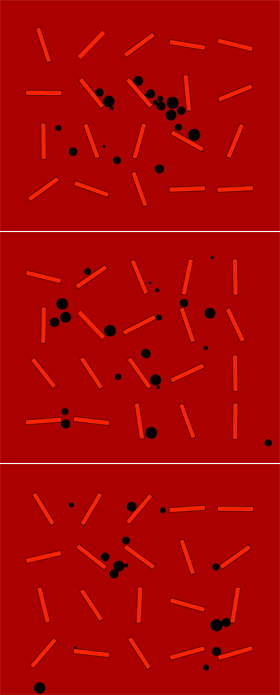Actionscript:
-
import com.actionsnippet.qbox.*;
-
import Box2D.Common.Math.*;
-
-
[SWF (backgroundColor=0xaa0000, width=700, height=600)]
-
-
const TWO_PI:Number = Math.PI * 2;
-
-
var sim:QuickBox2D = new QuickBox2D(this,{gravityY:20, debug:false});
-
-
var i:int = 0;
-
-
// add some circles
-
var circles:Array = [];
-
var circleNum:int = 20;
-
for (i = 0; i<circleNum; i++){
-
circles[i] = sim.addCircle({x: 8, y:-2 - i, radius:0.1 + Math.random()*0.4, fillColor:0x000000});
-
}
-
-
// add some boxes
-
var boxes:Array = [];
-
var boxNum:int = 20;
-
for (i= 0; i<boxNum; i++){
-
var rx:Number = 4 + (i % 5) * 4;
-
var ry:Number = 4 + int(i / 5) * 4;
-
var ra:Number = Math.random() * TWO_PI;
-
boxes[i] = sim.addBox({x:rx, y:ry, width:3, height:0.4, angle:ra, density:0,fillColor:0xFF2200});
-
}
-
-
// vector(0,0) used to reset velocity
-
var resetVec:b2Vec2 = new b2Vec2();
-
-
sim.start();
-
sim.mouseDrag();
-
-
addEventListener(Event.ENTER_FRAME, onLoop);
-
function onLoop(evt:Event):void {
-
// rotate all boxes
-
for (i= 0; i<boxNum; i++){
-
boxes[i].angle += .05;
-
}
-
// move circles to top of sceen after they fall off bottom
-
for (i= 0; i<circleNum; i++){
-
if (circles[i].y> 20){
-
circles[i].y = -1;
-
circles[i].x = Math.random()*(stage.stageWidth / 30 - 9) + 4;
-
// access to Box2D b2Body methods
-
circles[i].body.SetLinearVelocity(resetVec);
-
}
-
}
-
}
This is another QuickBox2D experiment. If you don't know what QuickBox2D is ... read about it here.
Take a look at the swf here

Actionscript:
-
import com.actionsnippet.qbox.*;
-
-
var sim:QuickBox2D = new QuickBox2D(this, {debug:true});
-
// use the box2D default renderer (debug : true)
-
-
sim.createStageWalls();
-
-
// anchor
-
var pre:QuickObject = sim.addCircle({x:9, y:3, radius:.5, density:0});
-
-
// create a chain of boxes
-
for (var i:int = 0; i<12; i++){
-
var curr:QuickObject = sim.addBox({x:10 + i, y:3, width:.9, height:.9, angularDamping:1});
-
-
// currently always adds a b2DistanceJoint
-
sim.addJoint({a:pre.body, b:curr.body,
-
x1:9 + i, y1: 3, x2: 10 + i, y2:3, collideConnected:false});
-
pre = curr;
-
}
-
-
// add a circle, use CCD (isBullet)
-
sim.addCircle({x:20, y:10, radius:1, isBullet:true});
-
-
// start simulation
-
sim.start();
-
sim.mouseDrag();
This snippet uses my QuickBox2D library to create a chain. QuickBox2D is a wrapper for Box2DFlashAS3 that greatly simplifies world setup, instantiation and graphical skinning of rigid bodies (more info on yesterdays post)...
See the swf here.
Download Box2DFlashAS3 here
Download QuickBox2D Alpha 104 here
See yesterdays post for additional information. I'm still in the process of writing some docs and possibly a tutorial for QuickBox2D... hopefully I'll finish with that soon...
If your somewhat familiar with Box2D and just want to just dig right in, the following scrap of information may help:
// Methods of the QuickBox2D class, used for creating rigid bodies and joints
addCircle();
addBox();
addPoly();
// currently only creates b2DistanceJoints
addJoint();
these function all take one parameter Object as their argument. The common parameter properties for rigid bodies are:
// QuickBox2D simpleRender settings:
lineColor:0x000000
lineAlpha:1
lineThickness:0
fillColor:0xCCCCCC
fillAlpha:1
// wrapped Box2D properties
x:3
y:3
density:1
friction:0.5
restitution:0.2
angle: 0
linearDamping:0
angularDamping:0
isBullet:false,
fixedRotation:false
allowSleep: true
isSleeping:false
// advanced use
maskBits:0xFFFF
categoryBits:1
groupIndex:0
//and the specific param properties are:
addCircle() : radius
addBox() : width, height
addPoly() : verts
//Joints have the following properties... not going to bother explaining these until I write the docs:
addJoint() : a, b, x1, x2, y1, y2
